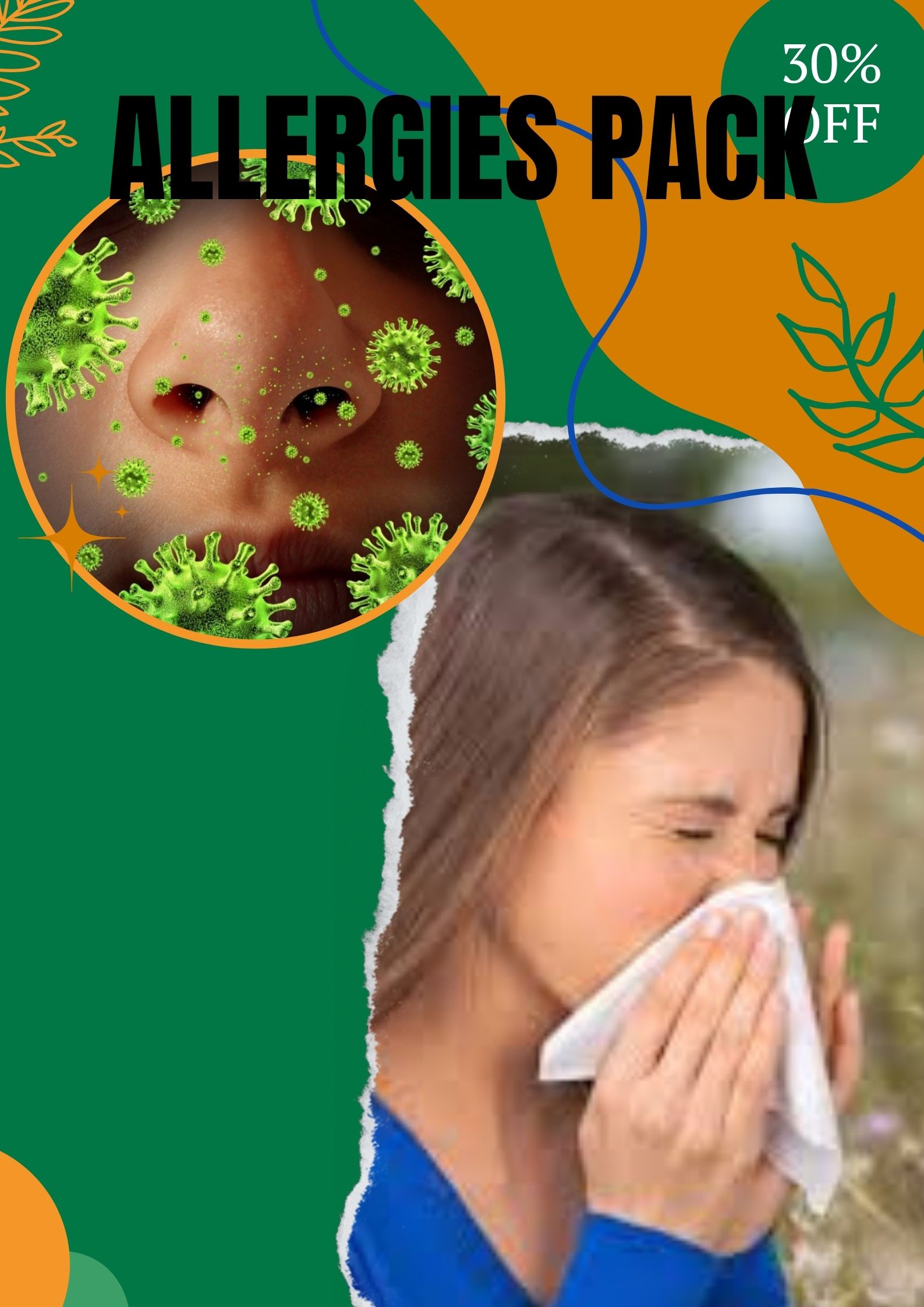Natural treatment for Allergies
₵400.00 – ₵750.00Price range: ₵400.00 through ₵750.00
SKU: N/A
Category: Immunity
What Is Allergies?
Allergies refer to an abnormal immune response triggered by exposure to substances that are usually harmless to most people. These substances, known as allergens, can include pollen, pet dander, dust mites, certain foods, medications, insect stings, or latex. When individuals with allergies come into contact with allergens, their immune system overreacts, leading to various symptoms.
Types of allergies include:
1. Respiratory Allergies: These allergies affect the respiratory system and commonly manifest as hay fever (allergic rhinitis), triggered by allergens such as pollen, mold, or pet dander. Symptoms include sneezing, itching, runny nose, congestion, and watery eyes.
2. Food Allergies: Individuals with food allergies experience adverse reactions to specific foods such as peanuts, tree nuts, eggs, milk, wheat, soy, fish, or shellfish. Symptoms can range from mild to severe and may include hives, itching, swelling, difficulty breathing, abdominal pain, vomiting, or anaphylaxis.
3. Skin Allergies: Skin allergies, such as dermatitis or eczema, occur when the skin comes in contact with allergens like certain metals (nickel), latex, cosmetics, fragrances, or certain medications. Symptoms typically include redness, itching, rash, or blisters.
4. Insect Sting Allergies: Some individuals experience allergic reactions to insect stings, such as those from bees, wasps, hornets, or fire ants. These reactions can cause local swelling, redness, pain, or, in severe cases, whole-body reactions.
The causes and triggers of allergies can vary, but they often include genetic factors and environmental exposures. Additionally, repeated or excessive exposure to certain allergens may sensitize the immune system, leading to allergic reactions over time.
The effects of allergies can range from mild to severe, depending on the individual and the allergen involved. Mild symptoms may include nasal congestion, sneezing, or skin irritation, while severe allergies can result in anaphylaxis, a potentially life-threatening reaction characterized by difficulty breathing, swelling of the throat, rapid pulse, or dizziness.

Preventing allergies involves a combination of avoidance strategies and appropriate management:
1. Identifying Allergens: Determine the specific allergens causing your allergic reactions and take steps to avoid them.
2. Avoidance Measures: Minimize exposure to allergens by keeping your living environment clean, using allergen-proof bedding and covers, and avoiding known triggers.
3. Medications: Over-the-counter or prescription medications such as antihistamines, nasal sprays, or eye drops can help alleviate allergy symptoms. Consult a healthcare professional for proper guidance.
4. Allergy Shots: Immunotherapy, also known as allergy shots, can be recommended for individuals with severe allergies to decrease sensitivity to specific allergens over time.
5. Emergency Preparedness: Individuals with severe allergies should carry epinephrine auto-injectors (Epi Pens) and ensure that their family, friends, or coworkers are aware of their condition and how to respond in case of an emergency.
If you suspect you have allergies, it is advised to place an order on our natural allergy treatment pack for fast healing from its unusual symptoms. Our natural Allergy pack contains Anti- histamine and Anti – allergy, It efficacy is very high so dealing with any type of allergy is nothing to talk about when it comes to our natural allergy treatment pack.
PRICES FOR OUR NATURAL ORGANIC TREATMENT PACK
Full Pack – Ghc 750
Medium Pack – Ghc 550
Minimum Pack – Ghc 400
| Packages | Full, Half, Mini |
|---|
Related products
Sale!
₵750.00 – ₵1,800.00Price range: ₵750.00 through ₵1,800.00
Sale!
₵350.00 – ₵750.00Price range: ₵350.00 through ₵750.00
Sale!
Uncategorized
₵850.00 – ₵2,800.00Price range: ₵850.00 through ₵2,800.00
Sale!
Rated 5.00 out of 5
₵300.00 – ₵1,200.00Price range: ₵300.00 through ₵1,200.00
Sale!
Immunity
₵500.00 – ₵1,000.00Price range: ₵500.00 through ₵1,000.00
Sale!
Immunity
₵550.00 – ₵900.00Price range: ₵550.00 through ₵900.00
Sale!
₵300.00 – ₵600.00Price range: ₵300.00 through ₵600.00
Sale!
Immunity
₵650.00 – ₵1,600.00Price range: ₵650.00 through ₵1,600.00










